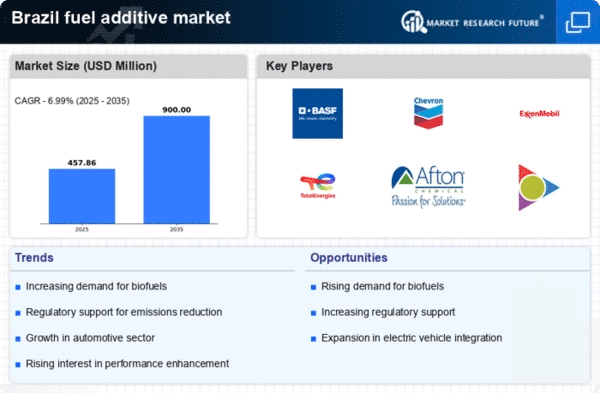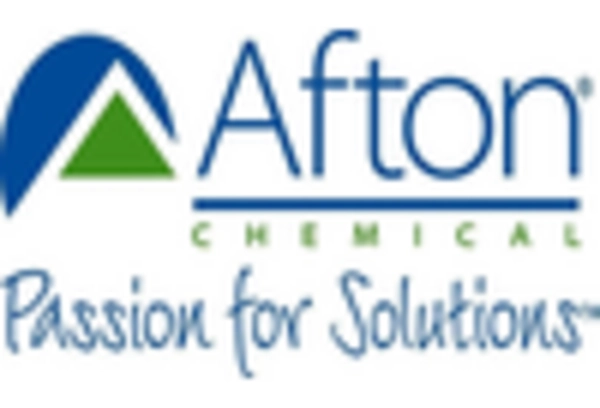The fuel additive market in Brazil exhibits a dynamic competitive landscape, characterized by a blend of established players and emerging innovators. Key growth drivers include the increasing demand for fuel efficiency, stringent environmental regulations, and the rising adoption of advanced fuel technologies. Major companies such as BASF (DE), Chevron (US), and Afton Chemical (US) are strategically positioned to leverage these trends. BASF (DE) focuses on innovation and sustainability, emphasizing the development of eco-friendly additives. Chevron (US) is enhancing its market presence through strategic partnerships and regional expansions, while Afton Chemical (US) is concentrating on digital transformation to optimize its product offerings and customer engagement. Collectively, these strategies shape a competitive environment that is increasingly focused on sustainability and technological advancement.In terms of business tactics, companies are localizing manufacturing to reduce costs and enhance supply chain efficiency. The market structure appears moderately fragmented, with several key players exerting influence over various segments. This fragmentation allows for niche players to thrive, while larger corporations capitalize on economies of scale and brand recognition. The collective influence of these key players fosters a competitive atmosphere where innovation and customer-centric strategies are paramount.
In October Chevron (US) announced a strategic partnership with a Brazilian biofuel producer to enhance its portfolio of sustainable fuel additives. This collaboration is expected to bolster Chevron's position in the market by integrating renewable resources into its product line, aligning with global sustainability trends. The strategic importance of this partnership lies in its potential to meet the growing consumer demand for greener fuel options, thereby enhancing Chevron's competitive edge.
In September Afton Chemical (US) launched a new line of fuel additives specifically designed for the Brazilian market, focusing on improving engine performance and reducing emissions. This product launch is significant as it demonstrates Afton’s commitment to addressing local market needs while reinforcing its position as a leader in innovation. By tailoring its offerings to the unique requirements of Brazilian consumers, Afton is likely to strengthen its market share and customer loyalty.
In August BASF (DE) unveiled a new research and development facility in Brazil aimed at accelerating the development of advanced fuel additives. This investment underscores BASF's commitment to innovation and its strategic focus on sustainability. The establishment of this facility is expected to enhance BASF's ability to respond to market demands swiftly, thereby solidifying its competitive position in the region.
As of November current trends in the fuel additive market are increasingly defined by digitalization, sustainability, and the integration of artificial intelligence. Strategic alliances are becoming more prevalent, as companies seek to enhance their technological capabilities and expand their market reach. The competitive differentiation is likely to evolve from traditional price-based competition to a focus on innovation, technology, and supply chain reliability. This shift indicates a future where companies that prioritize sustainable practices and technological advancements will likely lead the market.
















